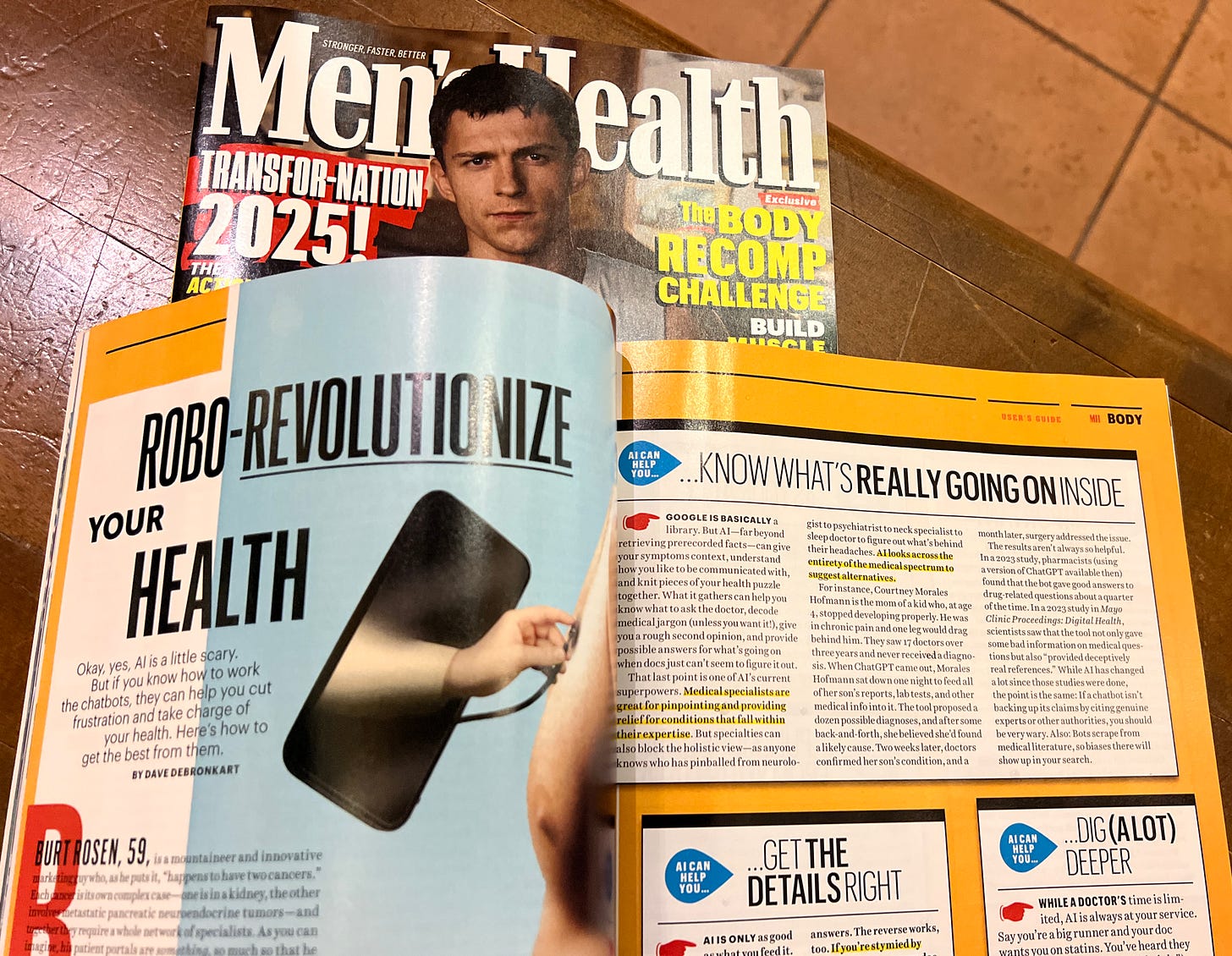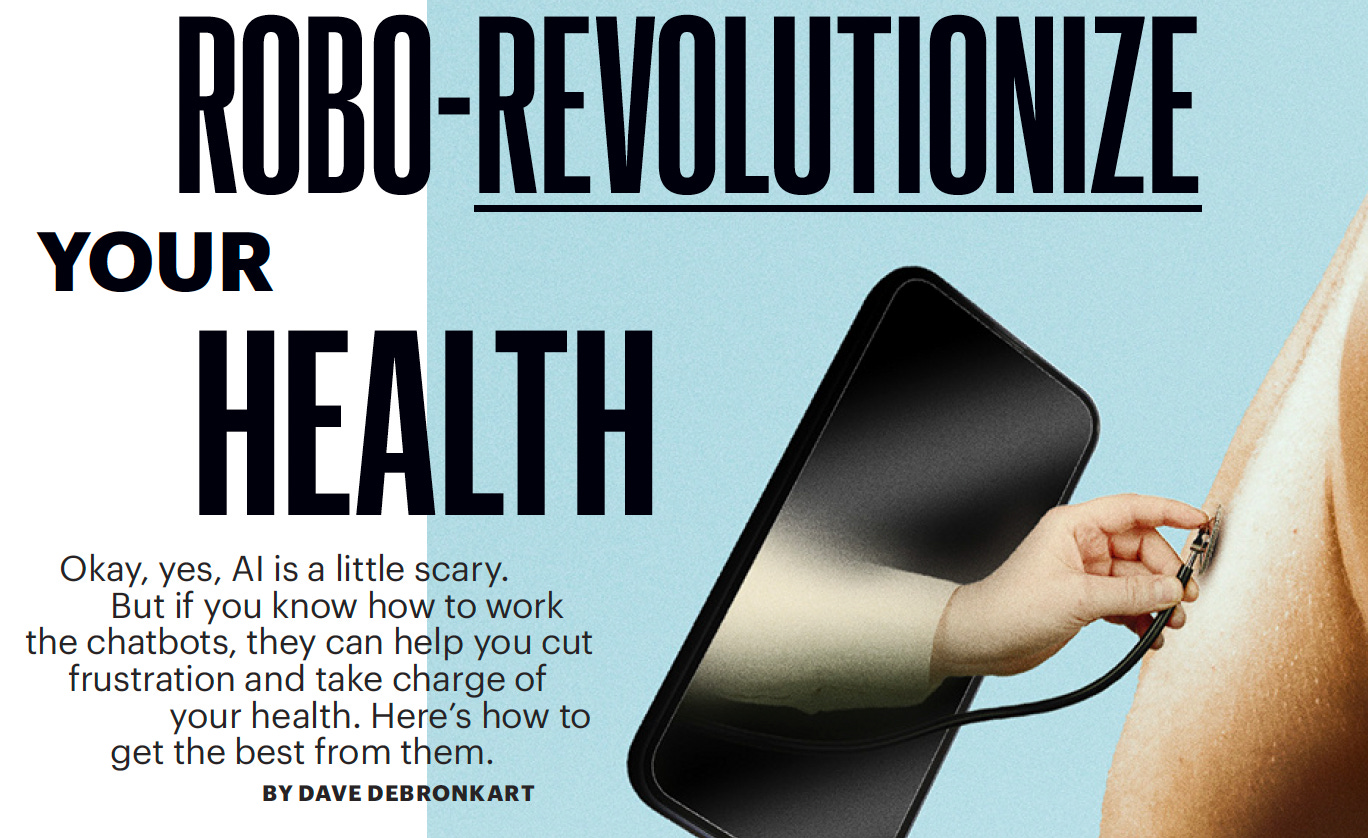#PatientsUseAI is in Men's Health
We're mainstream! Stories from this blog make the national newsstand
The January/February issue of Men’s Health is on the newsstands, and there’s a big gorgeous full color four page spread about patients using AI for their medical needs. And I wrote it! :-) (Most of it. They gave me tremendous editorial help!)
Seriously, this is big news for the #PatientsUseAI movement. We’ve had articles about patients as AI users in newspaper coverage (New York Times), and in a major medical journal, NEJM AI (When Patients Take AI Into Their Own Hands and another column that encourages patient use). But this is the first time I know of that a major magazine asked for an article by a patient, about patients. It’s in print now, and will be online in a couple of weeks.
Especially exciting, therefore, is that numerous patient stories from this blog made it into the national media: (each name here links to their post on this blog)
Burt Rosen opens the article: “Burt Rosen, 59, is a mountaineer and innovative
marketing guy who, as he puts it, ‘happens to have two cancers.’” He uses ChatGPT to help understand his radiology reports.
Courtney Morales Hoffman, the mom (and entrepreneur) who spent four hours with ChatGPT one night and figured out her 7 year old son’s diagnosis, which had escaped 17 doctors. (Did you know she’s started a company to compile complete medical records for caregivers?)
Grace Cordovano, a caregiver and professional patient advocate, who also suffered all the stresses of being wrongly diagnosed with cancer. She’s covered for her successful work using ChatGPT to fight an insurance denial for a client.
Sue Sheridan is covered for using ChatGPT to confirm her suspicion that her ER blew the diagnosis.
Hugo Campos is best known as a heart patient himself, but he’s also a black-belt AI user for himself and his father. He’s covered for using the nifty trick of telling ChatGPT what kind of expert to play: he “told ChatGPT to think, act, and speak like a specialist. He typed: ‘You are a dermatologist fellow presenting a case of a 94-year-old male patient with six weeks of pruritic rash’…” He did this while waiting three months for his suffering father’s specialist appointment. (It worked: Dad’s rash cleared up a month before the appointment.)
Indeed, one of the major reasons patients use AI is to do whatever they can while waiting for the health system. As Hugo loves to say, “At last - autonomy!”
Approval from important authorities
As an evangelist for changing the culture of healthcare, I’ve long been thrilled when people in authority have endorsed the things we evangelists say. So I’m extra thrilled that the article has extensive contributions from Isaac “Zak” Kohane, the editor in chief of NEJM AI — the AI journal in the prestigious New England Journal of Medicine family.
Zak’s involvement illustrates something exquisitely important: nothing about patient empowerment is a rejection of doctors. (To the contrary, after my own near-death cancer case in 2007, my oncologist said in the BMJ that he’s not sure I could have survived if I “hadn’t been so well prepared.”)
The truth is that the outcome of a medical case is the sum of contributions from all parties - including an informed patient. (I don’t mean idiots who reject science; I mean informed patients.)
In the article Zak says, “Use these AI models as super-low-cost, no-social-risk, instant second-opinion sources,” then adds much more specific advice. He also adds the importance of verifying any advice before you take action, exactly as you should do with an important decision from a human doctor. “Trust, but verify,” he says, quoting the famous politician’s line. (That echos what we call “Hugo’s Law,” from Hugo Campos: “I don’t ask it for answers - I use it to help me think.”)
The magazine also reached out to the great Jen Goldsack, CEO of DiME, the Digital Medicine Society, about all that’s going on in the world of wearables … especially the data they generate and how some products interpret it with built-in AI.
How do you use AI for your health?
Every patient story in that article, and every piece on this blog, came from a patient telling us what they were doing with AI. Would you like to share your story? Drop me a note at dave@epatientdave.com, and we’ll talk. You can be named or anonymous.
This is really important, people. What’s possible is expanding for people like you and me (and Burt and Sue and...) to take meaningful action for our families’ care. The more real-world stories we have — and the more they show up in the national news — the sooner all of medicine will come to realize that this is a very good thing.




